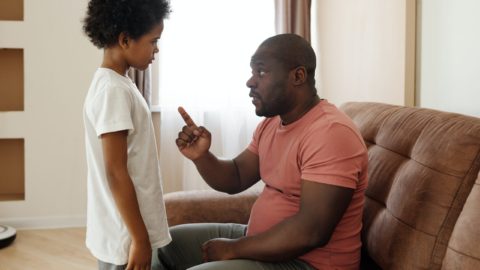We are dealing with unexpected challenges and risks during the coronavirus pandemic (i.e. healthcare, finances). If that weren’t enough, millions of us are also facing childcare challenges.
It is important to recognize that these challenges can feel even more overwhelming as our families try to deal with the confusion caused by unplanned changes in routines, moods, and social interaction during this pandemic.
I hope the points below strengthen you and help you find the energy to build a support system for yourself and your children. You can find techniques for “coping” that will improve this challenging journey for everyone!
1. REALIZE THAT THE UNEXPECTED AND UNWELCOME CHALLENGES AND RISKS CAUSED BY THE CORONAVIRUS PANDEMIC AFFECT EVERYONE—INCLUDING YOU.
You are not weak! You are not alone! We all feel isolated because we are isolated!
We feel confused and worried because the daily schedules that organized our lives no longer exist. Also, we no longer know what to do and when to do it. The resources we had (income, time with friends, opportunities to celebrate our victories) are often no longer available in ways we can rely on.
Don’t underestimate the effect of this pandemic on you, your patience, your energy, and your personal resources. Once you are aware of how you are currently feeling, you can begin to take control. This control consists of focusing on doing things that will allow you and others in your lives to support and care for one another, enjoy time together, experience some degree of comfort, and perhaps even to have some fun.
Here’s an example for those of you who are caring for children. Instead of just sitting on your family couch, turn it into the family “space ship.” Build your rocketship with blankets and pillows. Let your children pilot the space ship to wherever they want to go. Intentionally try to let go of your adult worries and join the spaceship rides that you used to enjoy as a kid.
Remember, too, that children are not the only ones whose sense of balance and safety depends on the care they receive and how their needs are met.
Adults are also “stressed” from the frightening impact of the coronavirus pandemic on their lives! Regularly participating in and/or appreciating a child’s imaginative play may no longer be possible for adults to enjoy. Perhaps you can find alternative activities that you can share, such as reading, drawing, or listening to music together.
Bottom line: the upset in our lives affects the balance in our relationships!
As such, it is important for the adults to understand the need to find new ways to strengthen relationships in the home. Share with your family the importance of respecting everyone’s emotions. To help your children with this, perhaps choose an object that informs everyone when someone feels upset. For instance, when a family member holds up a particular towel or pillow, he is letting everyone else know that he needs some quiet time or some extra TLC (“Tender Loving Care”).
All of us are trying to understand the changes in our lives. We must realize that attempts to cope with those changes and our feelings vary from person to person. Not everyone has the same ability to understand and maintain control over their emotions. However, our children rely on us to remain calm. They need us to explain things in simple terms and be supportive despite changes in feelings and moods.
For the child undergoing stress, give the child a Band-Aid-size piece of tape on his arm or hand to help him “heal” his injury. (Even if the injury is related to his feelings!)
Also consider putting together family meetings where your children can ask you questions. In these meetings, support an honest discussion, but most importantly, maintain control over your own feelings.
For example, you can let your children know you are also uncomfortable with the changes in schedule and that everyone is stuck at home without breaking down and crying about how scared you are feeling.
2. REMEMBER THAT YOUR FEARS AND CONCERNS ARE NOT A SIGN OF WEAKNESS.
Like so many other adults, you are dealing with the same worries and frustrations that may be causing you extreme stress and discomfort. We are all struggling with fears and potential threats we have never faced before! It is important that we recognize our own discomfort along with the discomfort of others. The pandemic threat affects everyone, of every age, across the globe!
Often we do not even realize the extent of how we are affected. If you are more tired, increasingly withdrawn, and more easily irritated, it is probably related to these issues.
Remember, too, that children are also dealing with these issues along with dealing with the changes in their lives. This includes:
- Changes in schedule
- No longer being able to attend school/day programs
- Having to stay safely at home
- Living with adults who may be less patient and less emotionally available to provide support, join in play and creatively, or fill the additional time that children now have at home
As everyone struggles to deal with the burden of their own worries, BOTH children and adults have less energy to focus beyond their own needs. In spite of this, it is essential that we all work toward supporting our families during the COVID-19 pandemic.
3. YOU ARE NOT IN CONTROL OF THE CORONANVIRUS. HOWEVER, YOU ARE IN CONTROL OF YOUR THOUGHTS, YOUR ACTIONS, AND YOUR INTERACTIONS.
Whether talking to your children or thinking quietly to yourself, you can deliberately choose to focus your comments on “solutions” to the challenges you are all living through rather than focusing on the impossible hurdles you are facing.
For example, to stay healthy, everyone in the family remains at home. Describe “staying at home” in ways that your children do not feel it as a “lockdown.” To keep life interesting each day, work as a family to make a list of activities. Perhaps even work together to create a family schedule at the beginning of each day by getting input from everyone while writing out the schedule.
4. FEEL MORE IN CONTROL BY PRIVATELY ACKNOWLEDGING THE IMPACT OF THE CORONAVIRUS PANDEMIC ON HOW YOU ARE FEELING.
Many adults lost their jobs andsource of income. Likewise, children cannot attend school or play with other children as a meansto avoid spreading the coronavirus. Everyone feels somewhat “trapped” due to the threat of coming in contact with others and catching the highly contagious coronavirus!
Additionally, the intensity of the challenging and defiant behavior presented by many children in response to the traumatic changes in their lives only increases the stress on families and the adults caring for those children. Remind both yourselves and your families that you remain focused on keeping everyone safe. In order to help everyone in the family, they should remain focused on following your directions.
At the same time, recognize that how you communicate during these conversations has a powerful effect on how others hear what you say and how they feel. If you sound aware and alert, your comments sound like useful information and solutions. If you sound afraid and confused, your comments potentially trigger fear in those listening. Especially in the case of children, sounding aware and alert remains important. Encourage family discussions to consider ways everyone can protect themselves from catching the virus.
5. AVOID THE “PERFECT STORM” THAT COULD RESULTS IN UNMANAGEABLE FEAR AND UNACCEPTABLE BEHAVIOR.
You cannot control the coronavirus. However, you can retain total control over how you respond to the risks. Likewise, you control the steps you take to increase safety and how you deal with the changes in your life. While the effects of coronavirus isolation are potentially overwhelming, controlling the “overwhelm” is something each of us can do as we remind ourselves that this, too, had a beginning and will also have an ending. In fact, this is exactly the message that you want to communicate to your children.
6. FOCUS ON REALISTIC AND POSITIVE SOLUTIONS THAT AVOID DISASTERS.
For those with children, remember that you share your thoughts and feelings even when you don’t realize it. Over 90% of communication is “non-verbal.” As such, your thoughts, feelings, facial expressions, and body language communicate very strong messages to your children.
Finally, remember the big difference between sharing solutions and feelings in a way that frightens your children and instead work towards sharing solutions and feelings in a way that communicates honestly and hope to them.
For example, emphasize that experts continue to work toward solutions while we continue learning more effective ways to keep ourselves safe and healthy. Examples include getting exercise every day, not sharing food, and washing our hands, etc.
7. CHOOSE SPECIFIC DAYS OR SPECIFIC TIMES TO FOCUS ON “RECHARGING OUR BATTERIES.”
Make a list with your kids of how we can keep ourselves “energized.” Perhaps even announce that “today we will not be listening to any news shows” and all televisions and electronics must be focused on other shows. The parent can make it fun by being the “cop” and giving out tickets to those who break that law and a “high 5” (or a treat or a special privilege) to those who follow that rule.
8. REMEMBER THAT ROUTINES REDUCE DISCOMFORT, BOREDOM, ANXIETY, AND CHALLENGES FOR EVERYONE.
Do not underestimate the powerful relationship between “structure” and “emotional comfort.” This is especially true during a time in our lives that is chaotic and threatening.
Recognize that when you intentionally take time away from your regular schedule (for example, taking a family vacation) activities typically combine with unplanned daily routines to create a sense of “adventure.”
However, when major changes in your schedule are not your choice, the results are very different and can be very uncomfortable.
9. NOTICE THE POSITIVE REGARDLESS OF CURRENT EVENTS LIKE CORONAVIRUS PANDEMIC.
Always remember to seize the opportunity to notice and comment on “the positive” regardless of what is happening. Pay close attention to when your children are playing quietly, cooperating, and following directions. Give them your praise and continue to empower them.
Remember that each of us has times of need and other times when we feel strong indeed! Be sure to let others in your life know when they have helped you and how they have helped you, including both adults and children!
Regarding children, ask yourself how you would prefer spending your time and energy. Would you rather add to stress by waiting until there is a problem and then try to get your children to cooperate? Or would you rather praise your children when they are behaving peacefully or asking for help politely (which encourages them to cooperate)?
Invite your children to let you know when they need your help. Perhaps set up a “point system” so your children can earn points toward something they find enjoyable. (See our blog post and resources on “Point Sheets” to help you!)
Focus on noticing early signs of boredom, fatigue, or need for attention. Before these early signs escalate into challenging behaviors, approach your child warmly and help them meet their needs in positive ways.
Remember that the coronavirus pandemic has created issues in every aspect of our existence and our daily lives. While we cannot control the damage already caused by the virus, we have significant control over how it affects our lives and others who are part of our world.
Empower yourself NOT the virus and its damaging effects!
Lastly, remember that while the future is not totally within our control, we do have significant control over how future events affect us.













